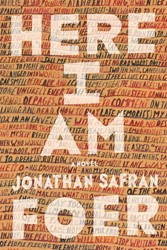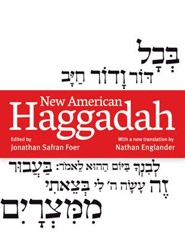From: Houghton Mifflin
1. Everything Is Illuminated is a novel written in two voices: Alex’s account of the fictional character Jonathan Safran Foer’s journey to Ukraine, and Jonathan’s magical history of the village of his ancestors. How would you describe these two voices? How is the language different? In what ways do the two narratives intersect or diverge? Why do you think the author chose to write the novel in this way?
2. On page 1, Alex refers to Jonathan Safran Foer as “the hero of this story.” Is he the hero? Why do you think the author Jonathan Safran Foer chose to give the protagonist of the novel his name? Does this decision affect how you read the story? Would the experience of reading Everything Is Illuminated be different if this character had another name?
3. Why does Jonathan travel to Ukraine? What is he searching for? What are Alex and his grandfather searching for on the journey? What does each character find?
4. On page 3, Alex says, “I had never met a Jewish person until the voyage.” How would you describe Alex’s view of Jewish people? What about his grandfather’s? Do these views change as the journey progresses?
5. On page 61, referring to his grandmother, Jonathan explains to Alex: “I couldn’t even tell her I was coming to the Ukraine. She thinks I’m still in Prague.” Why can’t Jonathan tell his grandmother about his trip? Why is it a secret? Which other characters have secrets they cannot tell their families? What secrets are concealed? What secrets are revealed?
6. Many of the chapters are titled “Falling in Love.” There are many kinds of love in the novel.On page 83, Jonathan writes about the love between Brod and Yankel: “But each was the closest thing to a deserving recipient of love that the other would find. So they gave each other all of it.” How would you describe this love?There is also Jonathan’s love of Augustine, the woman he is searching for. Alex writes, on page 24, “I am certain that I can fathom it.” In what ways do Jonathan and Alex love Augustine? How does Alex’s grandfather love her?Brod loves the Kolker, the man she marries. And there is Safran’s love for the Gypsy girl. What other kinds of love are there in the novel? How are they similar or different from each other?
7. Many of the reviewers of the book have noted the unusual and successful use of humor in the novel, especially in light of its concern with the tragic history of the Holocaust. On page 53, Alex writes to Jonathan: “Humor is the only truthful way to tell a sad story.” How would you describe the humor in the novel? How does it relate to tragedy? What are your feelings about using humor in a novel that deals with the Holocaust?
8. On page 79, Jonathan writes that Brod “would never be happy and honest at the same time.” And on page 117, Alex, frustrated by not finding Augustine, explains that “not-truths hung in front of me like fruit. Which could I pick for the hero? Which could I pick for Grandfather? Which for myself?” What roles do lies and deception play in Everything Is Illuminated? When and why are lies sometimes necessary? When do they hurt either the liar or the ones they lie to?
9. Many things and people are split in the novel: the two narratives; the twins, Hannah and Chana; the Kolker, his head literally split by a saw blade; the Double-House in Trachimbrod. What other doubles are there? Why do you think this is such a prominent theme in the novel? What does it reflect about human nature? How does it relate to the question of how we write about historical events, as made clear by the opening sentence of the second chapter: “It was March 18, 1791, when Trachim B’s double-axle wagon either did or did not pin him against the bottom of the Brod River.”
10. On page 154, following the realization that he has not found Augustine, Alex writes that “I persevered to think of her as Augustine, because like Grandfather, I could not stop thinking of her as Augustine.” Why do Alex and his grandfather refuse to acknowledge that the woman they meet is not Augustine? Why do they want her to be Augustine? Who is the woman really?
11. Guilt is a big theme in Everything Is Illuminated. On page 187, Alex’s grandfather, responding to the account of the Nazis’ murdering innocent Jews, tells Alex: “You would not help somebody if it signified that you would be murdered and your family would be murdered.” On page 227, Alex’s grandfather says, “I am not a bad person. I am a good person who has lived in a bad time.” Do you think Alex’s grandfather did anything wrong? Should he feel in any way guilty? If your answers to the two questions are different, how can that be? Are we responsible for the bad things that others do if we do nothing to stop them? Should we feel guilty if a family member did something bad in the past? Can we free ourselves from guilt for past deeds?
12. On pages 265 – 6, Jonathan writes, “Every widow wakes one morning, perhaps after years of pure and unwavering grieving, to realize she has slept a good night’s sleep, and will be able to eat breakfast, and doesn’t hear her husband’s ghost all the time, but only some of the time.” How do the characters in Everything Is Illuminated live their lives in the wake of tragic events? How do we both move on and still remember these events? What roles do stories play in reconciling ourselves with the past?
13. Do you consider the ending of the book hopeful or tragic? Why?14. What does the title of the novel, Everything Is Illuminated, mean? Does it mean one thing? What things are illuminated? What is illumination? What is gained and lost by illumination?





